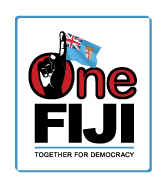
- INTELLIGENT RESISTANCE -
Free. Fair. Fearless. Intelligentsiya is made up of Fiji Islanders who are libertarians in their own way and who cherish the free flow of news, ideas and information and will peacefully resist any attempts by the country's military rulers to stifle free speech. intelligentsiya will also bear witness, report and discuss human rights abuses by the authorities.
September 26, 2012
ILO delegation to Fiji did not expect to be expelled
Updated 24 September 2012, 17:30 AEST
A senior member of the International Labour Organisation says Fiji's expulsion of a delegation from the UN body last week doesn't help the international community's confidence that Fiji is returning to democracy.
Peter Anderson, Chief Executive of the Australian Chamber of Commerce and Industry and spokesperson for the ILO's Freedom of Association Committee, says the expulsion was regrettable.
Speaking to the ABC's Whitney Fitzimmons, he said the delegation had arrived in Fiji under terms agreed to by the coup installed military government, so they weren't expecting to be kicked out.
Presenter: Whitney Fitzimmons
Speaker: Peter Anderson, Chief Executive of the Australian Chamber of Commerce and Industry and spokesperson for the ILO's Freedom of Association Committee
ANDERSON: Well it was very disappointing to learn of the expulsion, because it had been an agreed mission to Fiji on a very important matter and the issue is that there have been some breaches of internationally-recognised labour standards in the country and for those matters to be rectified, there needs to be a proper understanding of the facts and a good dialogue with the Fiji government and the international community. It seems to me as though the Fiji government don't yet realise the importance of at the highest levels having a dialogue with the international community through the International Labour Organisation to get to the bottom of these issues. If you don't have an open transparent process of dialogue, then you really are not going to be able to garner the respect of the international community on what are apparently some serious breaches.
FITZSIMMONS: Peter Anderson, what are the changes to the terms of reference that the ILO didn't agree to?
ANDERSON: Well, what we understand is the government essentially wanted the mission to accept that the breaches which had been understood to have existed by the ILO were not matters that had actually occurred in a way that had been set out. Now what the ILO needed was to be able to look openly at the facts and meet with all of the people that they needed to meet and that was a constraint on the work of the mission. It's an unacceptable constraint on the work of a mission in any country, because if you do want to get to the facts, then you can't just get one side of the story.
FITZSIMMONS: Tensions between the Fijian government and also Australia had lowered in recent months. Do you see that this will actually reignite protracted tension?
ANDERSON: Look, it's another setback in a relationship that doesn't need to be dealt these blows. Australia and particularly the Australian business community have a good relationship with Fiji. It's a wonderful country, it's a country in which there's good commercial opportunities on both sides of the relationship. But for a country like Fiji to not be complying with some basic labour standards sends a very negative message and it's not just something which is important to trade unions, even though these are labour standard breaches which have occurred with respect to trade union leadership, Those labour standards are important internationally, because they also protect the rights of business organisations to form and to associate and if those rights are breached in any country, there needs to be a response by the international community and an attempt to work with the government of the day to fix the problem, and unfortunately the expulsion of the ILO mission last week works against finding a solution.
FITZSIMMONS: Do you expect in your view, your on the inside, do you expect the Fijian government will bow to international pressure and allow the ILO back in on its own terms?
ANDERSON: I think that the only way forward in these situations is for the international community to have a strong view about what is right and acceptable and what is not acceptable, but also to have a determined effort to maintain a dialogue with the interim Fiji government, because ultimately, you will not get change in the decisions that have been made at high levels of the Fiji administration unless there is both international pressure and a dialogue. You need both of those elements to bring about change in what otherwise is a country that can take a leadership role in the Pacific.
FITZSIMMONS: Speaking of change, Frank Bainimarama has vowed to hold free and fair elections in 2014. What's your view on that, do you think he will?
ANDERSON: Well, there's been a number of promises and those dates have been pushed out. I think it's just impossible from where we sit now in Australia to really predict what the political situation in Fiji will become.
FITZSIMMONS: But you're not confident obviously?
ANDERSON: Well, we can't be confident, because of these sorts of developments last week, which come out of the blue. An agreed mission is handed a revised set of terms of reference and told unless you agree to them in their entirety, you're out of the country. Now that's not the way in which you ultimately move towards a transparent, open, democratic process. So what we do know is that the move towards democracy in Fiji will be supported by the Fiji administration engaging with and securing the respect of the international community and the expulsion of the International Labour Organisation's mission last Wednesday does not move that in the right direction.
Subscribe to:
Post Comments (Atom)
No comments:
Post a Comment